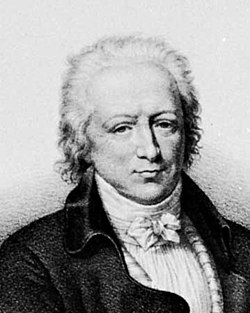Stanislas de Boufflers
Stanislas Jean, Chevalier de Boufflers (born May 31, 1738 in Nancy , † January 18, 1815 in Paris ) was a French writer , officer , encyclopedist and administrator of Lorraine origin.
Life
The Chevalier de Boufflers was born in Nancy as the son of François de Boufflers, Marquis d'Amestranges and Marie Françoise Catherine de Beauvau-Craon , who later became the favorite of Duke Stanislas I. Leszczynski . He first grew up at the court of Lunéville . Intended for the clergy, he studied in 1761 for six months at the Saint Sulpice seminary in Paris . During this time he wrote the story Aline, reine de Golconde , which earned him the sensational gratuity of 40,000 livres from Stanislas I. Leszczynski. Sedaine edited the story into a libretto .
The Chevalier decided to pursue a military career and joined the Order of Malta . From 1762 he took part in various campaigns that repeatedly brought him to Germany. From 1767 to 1777 he was commander of the Esterházy houzards regiment and was promoted to Maréchal de camp in 1784 . In 1766 de Boufflers made a trip to Switzerland, which also took him to Ferney to see Voltaire . There he made a notable etching of the philosopher, who in turn thanked Monsieur le chevalier de Boufflers with the Epitre XCVII A. The letters addressed to the mother during the trip appeared in print in 1770. In 1785 he assumed the office of governor of the French colony of Senegal to pay off debts . He proved to be a capable administrative officer and committed to fighting the slave trade until his replacement at the end of 1787 .
After returning to France in 1788, he married the writer Françoise Eléonore Dejean de Manville, Comtesse de Sabran , with whom he had been in correspondence since 1778. In the same year he became a permanent member of the Académie Française . At the beginning of the French Revolution he emigrated to Prussia . Friedrich Wilhelm II gave him lands in Poland that were to be settled with French emigrants. Since 1795 he was a member of the Prussian Academy of Sciences by order of the Prussian king .
Returned to France in early 1800, he became a fashion writer for the Jeunesse dorée . Antoine de Rivarol summarized his biographical stations: "Abbé libertin, militaire philosophe, diplomate chansonnier, émigré patriote, républicain courtisan". In 1815 the Chevalier de Boufflers died in Paris. According to his wish, he was buried next to his poet friend Jacques Delille .
Works
- Aline, pure de Golconde , short story, (Paris?), 1761
- Lettres à ma mère sur la Suisse (Paris?), 1770
- Traité sur le libre arbitre , Paris, 1808
- Correspondance inédite de la comtesse de Sabran et du chevalier de Boufflers 1778–1788 , Plon, Paris, 1875
- Journal inédit du second séjour au Sénégal (2 Déc. 1786 - 25 Déc. 1787) , Revue politique et littéraire, Paris, 1905
Work editions
- Œuvres mêlées de M. le chevalier de Boufflers, et de M. le marquis de Villette , (Cazin), Londres (Paris), 1782
- Oeuvres de [Stanislas de] Bouf [f] lers , Basel, 1803
- Contes du chevalier de Boufflers , Ed .: Octave Uzanne, Quantin, Paris, 1878.
literature
- YES. Taschereau, Notice sur le chevalier de Boufflers , Paris, 1827
- Henry Bordeaux, Les Gouverneurs du Sénégal , SPEP, 1960
- Nicole Vaget Grangeat, Le chevalier de Boufflers et son temps, étude d'un échec , Paris, Nizet, 1976.
- Paul Bouteiller, Le chevalier de Boufflers et le Sénégal de son temps (1785–1788), Lettres du Monde , Paris, 1995
Web links
- Short biography and list of works of the Académie française (French)
Individual evidence
- ↑ ÉPÎTRE XCIII. . voltaire-integral.com. Retrieved July 10, 2011.
- ^ Members of the previous academies. Stanislas Marquis de Boufflers. Berlin-Brandenburg Academy of Sciences , accessed on February 26, 2015 .
- ↑ Louis-Gabriel Michaud: Biographie universelle, ancienne et moderne ou histoire, par ordre alphabétique, de la vie publique et privée de tous les hommes qui se sont fait remarquer par leurs écrits, leurs actions, leurs talents, leurs vertus ou leurs crimes . tape 59 . Michaud, Paris 1835, p. 80 ( online in Google book search).
| personal data | |
|---|---|
| SURNAME | Boufflers, Stanislas de |
| ALTERNATIVE NAMES | Chevalier de Boufflers, Stanislas Jean |
| BRIEF DESCRIPTION | French writer, military and colonial administrator |
| DATE OF BIRTH | May 31, 1738 |
| PLACE OF BIRTH | Nancy , Duchy of Lorraine |
| DATE OF DEATH | January 18, 1815 |
| Place of death | Paris , France |
